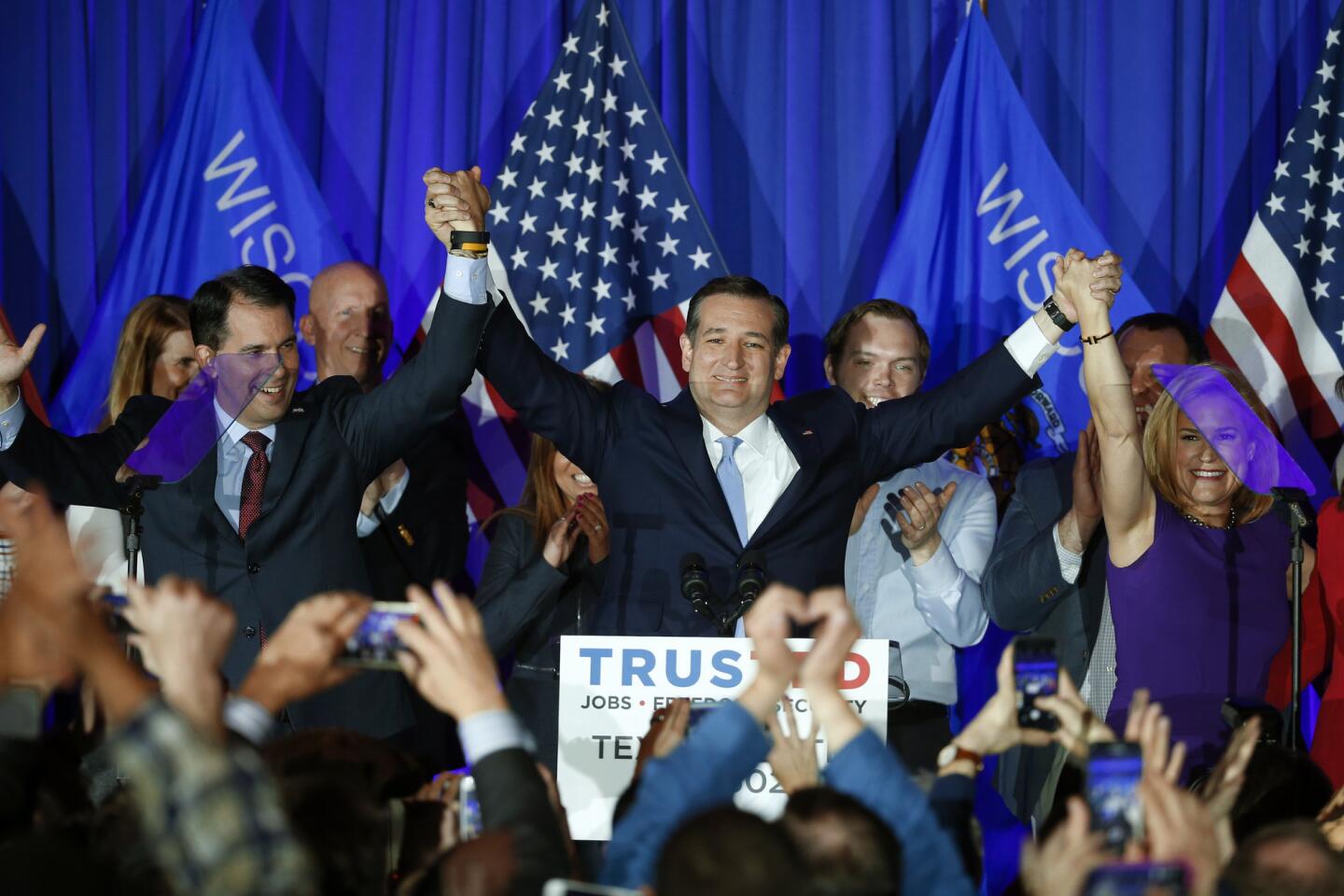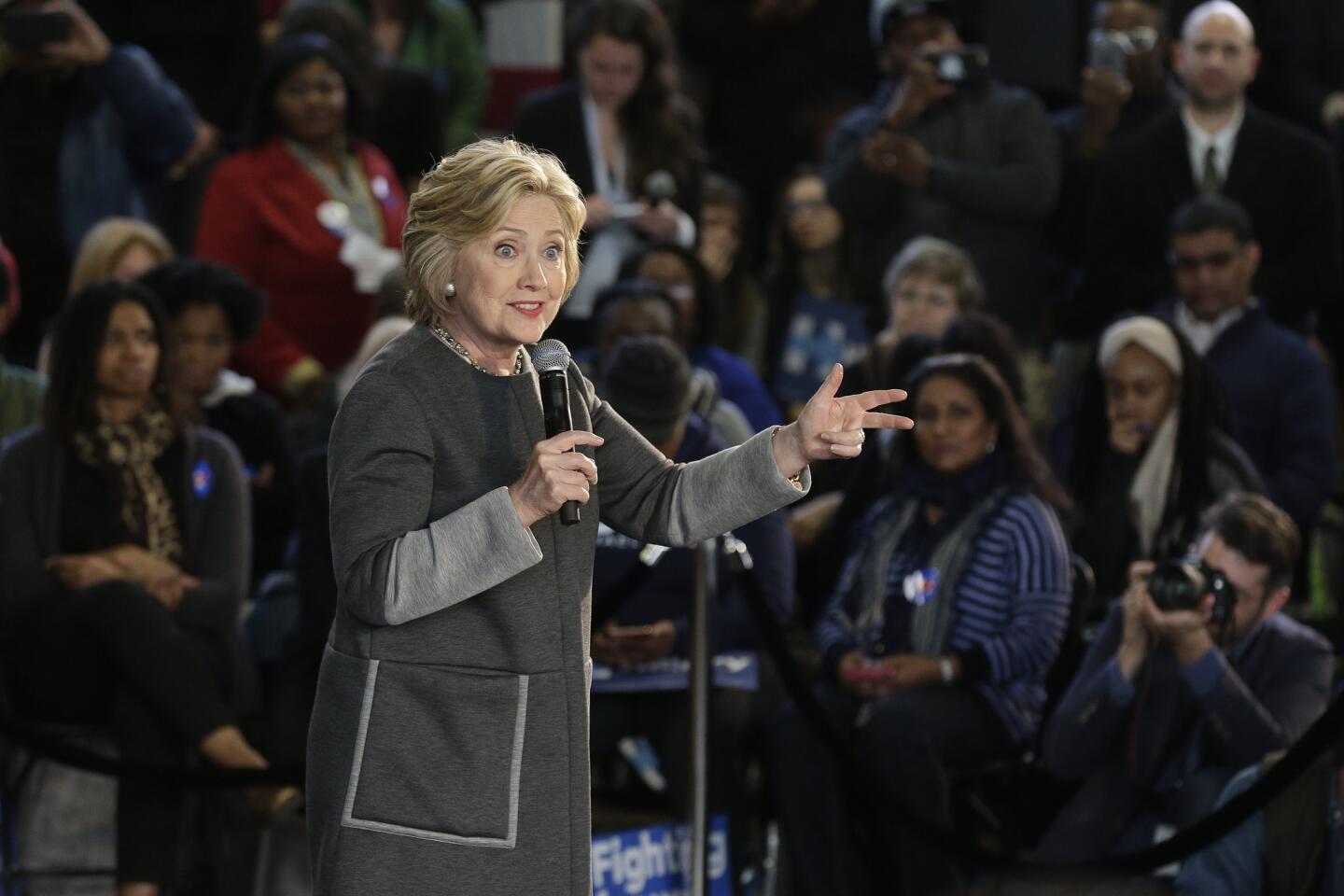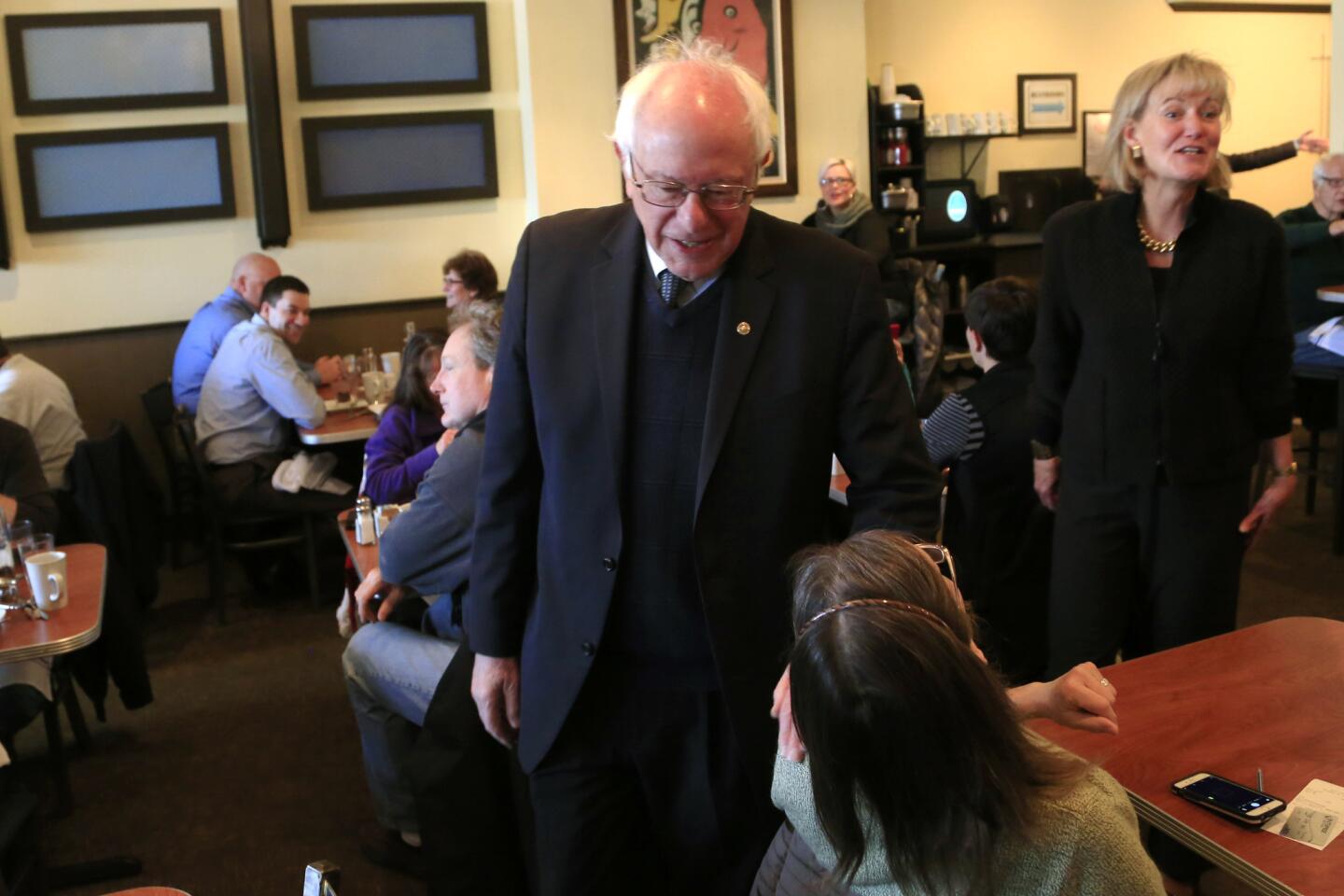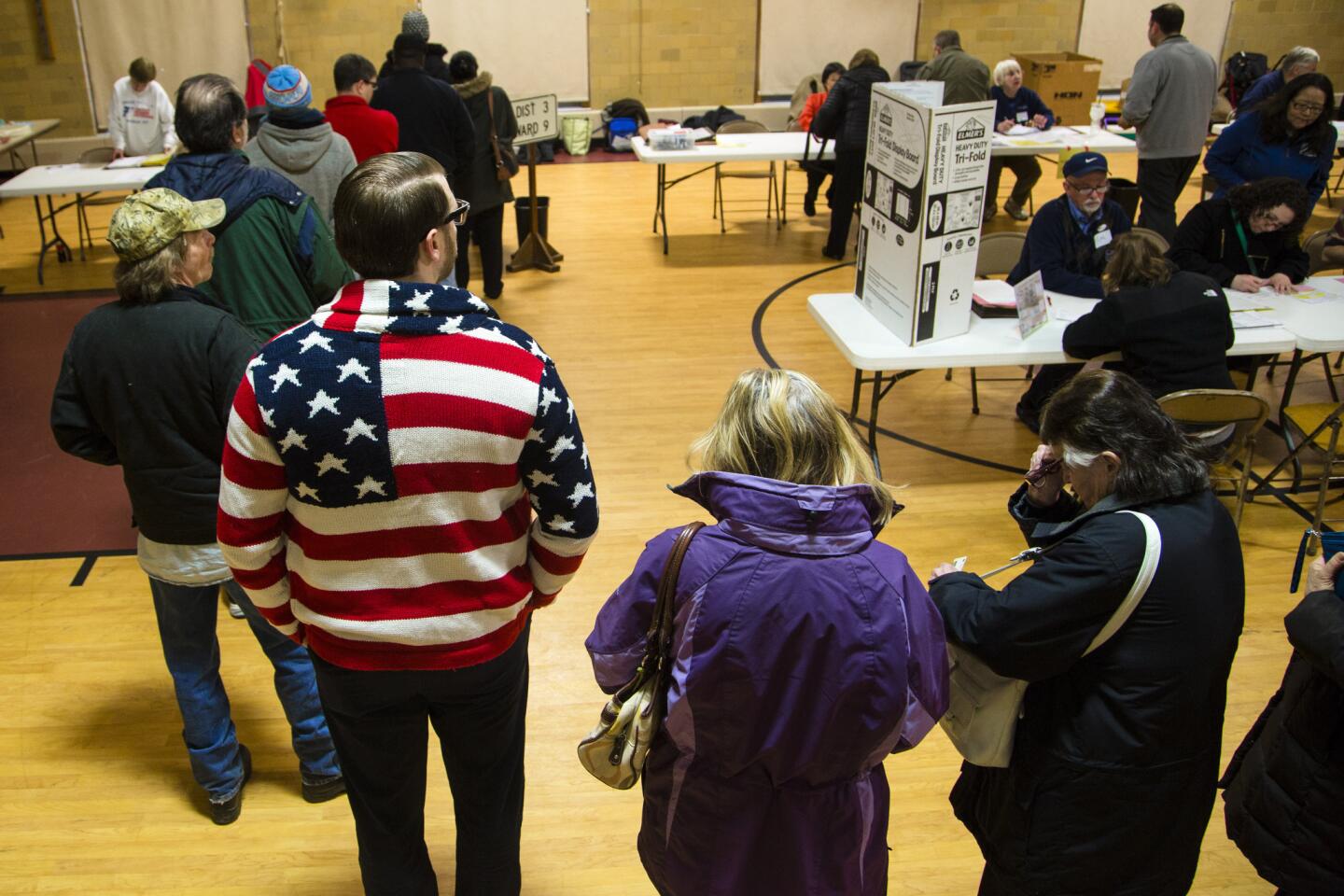Sanders says Wisconsin victory gives him momentum in the race against Clinton
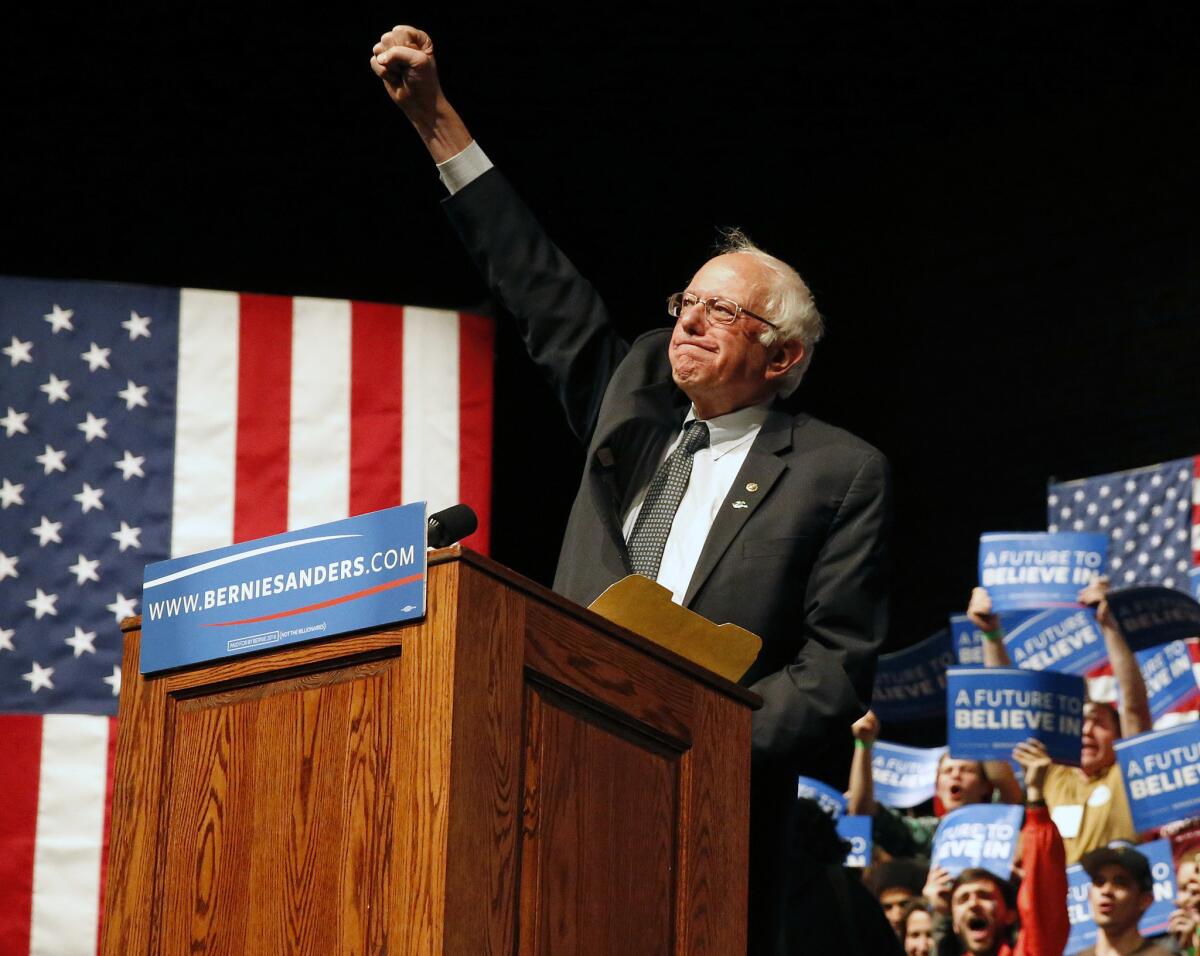
Bernie Sanders acknowledges supporters during a campaign rally in Laramie, Wyo., on Tuesday.
Reporting from Milwaukee — Sen. Bernie Sanders showed once again he remains a powerful force in the Democratic presidential race with a decisive win in Wisconsin on Tuesday, setting the stage for a lively political brawl in the coming days, during which he hopes to reshape the race with a defiant surge in New York.
Speaking to supporters in Laramie, Wyo., Sanders said the win would give him momentum to carry on toward larger contests later this month. Wyoming holds its caucuses Saturday.
“With our victory tonight in Wisconsin, we have now won seven out of eight of the last caucuses and primaries,” Sanders said. “And we have won almost all of them with overwhelming landslide numbers.”
Sanders, however, will find significantly more resistance in the Eastern states coming up than he did in Wisconsin, a state from which Hillary Clinton largely retreated as polls showed her trailing. Wisconsin’s Democratic primary electorate was more than 80% white and included large numbers of independent voters, who heavily favored the Vermont senator, as they have elsewhere during the primary season.
Clinton spent much of the week in New York, Sanders’ native state and the one she represented in the Senate, shoring up her operation and preparing for a fight her campaign hopes will put to rest lingering concerns about her candidacy.
But a tough battle lies ahead for the front-runner, even though she maintains such a large lead in delegates to the party’s nominating convention that nothing short of landslide wins from here out would put Sanders ahead of her. The Wisconsin results were a reminder that many Democrats disagree with her call to, as she says, vote not just with their hearts but with their heads.
A majority of voters in the Wisconsin primary said Clinton had a better chance of beating potential Republican nominee Donald Trump than Sanders does, according to an exit poll conducted for the Associated Press and the major television networks. But about a quarter of voters who took that position went for Sanders anyway. Almost none of the voters who thought Sanders would be the stronger candidate in November voted for Clinton.
Clinton’s weak showing with independents in Wisconsin also raised fresh questions about her vulnerabilities in November.
But Sanders’ strength among independents cuts both ways: In New York, only registered Democrats can participate in the primary on April 19. Independents are also locked out of Democratic primary voting in four of the five states that vote the week after New York, including delegate-rich Pennsylvania. In most states that have voted so far, Clinton has won heavily among Democrats.
The states coming up are also considerably more diverse than Wisconsin, which again is an advantage for Clinton. Blacks and Latinos have propelled the front-runner to her lead nationally, and the exit poll indicated that she carried non-white voters in Wisconsin as well.
The Wisconsin results are likely to increase the tension between the Democratic campaigns at a time when the race already had been growing more combative. Clinton, who has wavered throughout the campaign between engaging Sanders and looking past him toward the general election, has taken a particularly confrontational approach lately.
In recent days, she has accused the Sanders campaign of lying about her support from fossil-fuel interests and scolded Sanders protesters who disrupted a rally near her hometown of Chappaqua, N.Y.
She also accused Sanders of being cavalier about Trump’s suggestion that women should be punished if they undergo an abortion. Sanders, who supports abortion rights, had complained in a television interview that the news media was paying too much attention to Trump’s comments on the subject.
Her sharpened tone reflects annoyance within the Clinton campaign at the Sanders operation. Clinton’s advisors resent attacks the Vermont senator continues to make on the front-runner’s ties to Wall Street and other industries. They argue that the attacks are misleading and that Sanders is so far behind in the race that his criticisms serve only to help the eventual Republican nominee.
Yet Sanders continues to run as if the nomination were in striking distance.
Some Sanders voters said Tuesday that whether or not he could win the nomination was irrelevant to them: They would be voting for him anyway.
“It’s a message to Hillary,” said Sue Peterson of Milwaukee, a 64-year-old retired factory worker. “Instead of her being angry with Bernie supporters, she needs to listen to what we’re saying.”
Other Sanders supporters expressed optimism that Sanders would perform an electoral miracle.
“I know they keep saying he doesn’t have a chance, but I think he still has a chance,” said Kate Mau, 38, the owner of a yarn store interviewed outside a polling station in a middle-class neighborhood south of downtown Milwaukee.
Like several other voters, Mau expressed skepticism about Clinton.
“With Clinton, you’re never quite sure if she’s being forthright,” she said.
Plenty of Sanders supporters in Wisconsin also said they would be just fine voting for Clinton if she wins the nomination — a sentiment that polls indicate is shared by a large majority of Sanders backers nationally. Some even saw good in the Clinton “establishment” roots that Sanders constantly rails against.
“She knows how to pull all the levers in Washington, and that’s useful,” said Adam Cohen, a 34-year-old engineer who voted for Sanders.
Because the Democrats award delegates in proportion to each candidate’s vote, Sanders’ victory in Wisconsin might net him a dozen more delegates than Clinton. That would eat only a little bit into her large delegate lead — currently more than 260.
The advantage he gained Tuesday could easily be washed away if Clinton wins in New York and Pennsylvania, where many more delegates are at stake.
Sanders, though, will be a force to contend with in each of those states as well as the others that vote on April 26: Delaware, Maryland, Connecticut and Rhode Island. He had a huge fundraising month in March. His $44-million haul, which far exceeded that of the Clinton campaign and came from almost entirely small donors, provides him with the money needed to be a constant presence in the costly New York media market.
“I know a little bit about New York because I spent the first 18 years of my life in Brooklyn,” Sanders said Tuesday night. “Now, please keep this a secret. Do not tell Secretary Clinton. She is getting a little nervous, and I don’t want her to get more nervous. But I believe we have an excellent chance to win New York.”
In both the Tuesday night speech and one the day before in Milwaukee, Sanders largely avoided mention of Clinton, suggesting he may be looking to move his campaign away from a constant volley of barbs between him and the front-runner. That sort of restraint, however, could prove difficult to maintain in New York, where Sanders will be under constant attack from Clinton, her surrogates and even the state’s famously feisty news media.
Even as Sanders was basking in his Wisconsin victory, he was receiving a taste of how rough a New York campaign can be. He was pummeled by the New York Daily News for comments he made in an interview with the paper’s editorial board. A transcript of the interview showed Sanders struggling to explain how he could realistically implement his policy vision once in the White House.
More damaging, perhaps, was his unfamiliarity with the New York subway system, which the senator did not seem to realize had stopped accepting tokens many years ago.
Sanders also had difficulty with questions about whether gun manufacturers should have immunity from lawsuits, which led to outraged statements from supporters of a lawsuit filed by the families of victims of the Sandy Hook Elementary School massacre. Those responses led to Sanders being skewered on the cover of the tabloid.
The Clinton campaign happily sent reporters a full transcript of the Sanders meeting with the paper.
Clinton campaign manager Robby Mook also sought to put Wisconsin’s results in a broader context, offering supporters a “facts on where the race stands” posting on Medium. It noted that to catch Clinton, Sanders would have to win primaries by a landslide — 20-percentage-point victories — in New York, California, Pennsylvania and New Jersey, all places where he trails.
“We know the misleading spin will continue,” Mook wrote. “But we want you to know the facts about the real state of the Democratic primary.”
Halper reported from Washington and Megerian from Milwaukee. Times staff writer Michael Finnegan contributed to this report from Milwaukee.
ALSO
‘Bernie blackout’: Behind the numbers that have Sanders supporters protesting
Latinos and women blunting Sanders and Trump in California
Trump refuses to rule out third-party bid if he loses nomination
More to Read
Get the L.A. Times Politics newsletter
Deeply reported insights into legislation, politics and policy from Sacramento, Washington and beyond. In your inbox three times per week.
You may occasionally receive promotional content from the Los Angeles Times.
